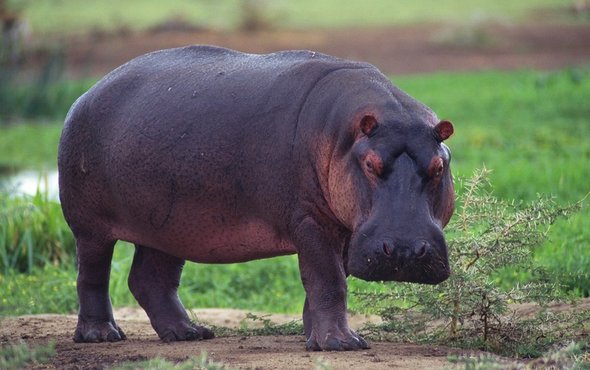(单词翻译:单击)
听力文本
This is Scientific American — 60-Second Science. I'm Jason G. Goldman.
They weigh about 3,000 pounds and eat about 100 pounds of plants each day. So your average adult hippo produces quite a lot of poop. By some estimates, a single hippo blasts out more than 10 pounds of waste each day.
And all that hippo dung gets mixed into the ponds and streams where they spend most of their time. We generally think of this process as beneficial, an ecosystem service, a way for nutrients to flow from terrestrial, streamside ecosystems into the water itself. Their dung is a sort of fertilizer for aquatic life.
And all of that is true—at least when water moves from pond to pond. At one time, many African waterways continued to flow even during the dry season. But people have diverted lots of that water for agriculture. So now, Tanzania's Great Ruaha River stops flowing during the dry season, leaving behind a serious of stagnant pools—in which the hippos keep on pooping.
"Especially in these high density pools at the peak the dry season, there's a huge buildup of dung. So we ended up pulling up these nets that have no fish but are just filled with hippo dung."

University of California, Santa Barbara, ecologist Keenan Stears. Unable to wash downriver, the nutrients build up while dissolved oxygen in the water decreases.
"And changes in the chemistry can influence biodiversity within these pools as well. So specifically, fish as well as aquatic invertebrates."
Only a few types of fish can survive in these oxygen-poor aquatic environments for more than a few weeks. It's bad news for biodiversity, but it's also deleterious for the dinner plate. Tilapia are an important source of protein for communities that rely on the rivers for their food. Hippos reduced tilapia abundance by 41% across the watershed the researchers studied. The results were published in the Proceedings of the National Academy of Sciences.
There is some hope, though. When the wet season returns and the rivers start to flow again, things can return to normal—if we're careful.
"But what our results do show is its not all doom and gloom. This is kind of resetting of the system when flow resumes shows that there is some kind of resilience within the system. And if we are able to manage the off-take of water from these rivers, the system is able to actually recover in terms of repopulating these pools in terms of biodiversity and abundance."
For Scientific American — 60-Second Science. I'm Jason G. Goldman.
参考译文
这里是科学美国人——60秒科学。我是杰森·古德曼。
它们体重约为3000磅,每天吃掉约100磅的植物。因此,普通成年河马会产生大量粪便。一些估计认为,一只河马每天就会排出超过10磅的废物。
所有的河马粪便都会混入它们常待的池塘和溪流中。我们通常认为这个过程是有益的,这是一种生态系统服务,是养分从陆地、河流生态系统流入水域本身的一种方式。河马的粪便是水生生物的一种肥料。
所有这些都是事实——至少当水从池塘流向池塘时是如此。曾经有一段时间,非洲许多水路即使在旱季仍有水流动。但是人们把大量的水引走用于农业灌溉。所以现在,坦桑尼亚的大鲁雅河在旱季已经不再流动,而且留下了大量的死水塘——而河马仍继续在这里排便。
“尤其是这些高浓度池塘,在旱季高峰期会有大量的粪便堆积。于是在我们把这些网拉上来时,会发现里面没有鱼,只有河马的粪便。”
加州大学圣巴巴拉分校的生态学家基南·斯蒂尔斯说到。养分因无法向下游流动而不断累积,同时水中的溶解氧量却在不断减少。
“化学变化也会影响这些池塘中的生物多样性。特别是鱼类和水生无脊椎动物。”
只有几种鱼能在这种缺氧的水生环境中存活几周的时间。这对生物多样性来说是个坏消息,同时对我们的晚餐供应来说也是不利的。对于依靠河流获取食物的社区来说,罗非鱼是重要的蛋白质来源。在研究人员展开研究的水域,河马令整个水域的罗非鱼数量减少了41%。这项研究结果发表在《美国国家科学院院刊》上。
不过,还是有希望的。当雨季回归时,河水再次开始流动,一切可能会恢复如常——只要我们小心一点。
“我们的结果显示,并非一切都暗淡无望。河水恢复流动时,系统的重置表明系统内部存在某种恢复能力。如果我们能管理这种从河流引水的做法,那在水塘再生、生物多样性和丰富程度方面,系统就能真正恢复。”
谢谢大家收听科学美国人——60秒科学。我是杰森·古德曼。
译文为可可英语翻译,未经授权请勿转载!
重点讲解
重点讲解:
1. leave behind 留下;余留;
I don't want to leave anything behind.
我不想留下任何东西。
2. end up 最终;结果;到头来;
But even if the Fed were to end up choosing restraint, it would not add up to a new Plaza arrangement.
但即便美联储最终选择克制,也不意味着会形成新的广场协议。
3. build up (使)积聚;(使)逐渐增加;
He is now trying to build up a fine reputation.
他正在努力逐步赢得好的声誉。
4. rely on 依赖;依靠;
He can rely on my support when the crunch comes.
关键时刻,他可以依靠我的支持。


